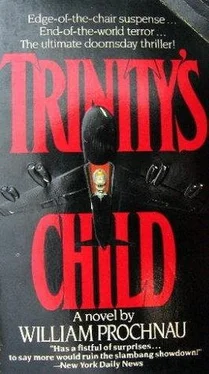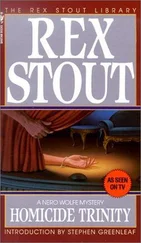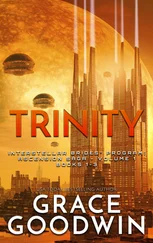“Still, to be an optimist, the United States would survive. The Soviet Union would survive. Neither would survive comfortably.” The general stopped uncertainly.
“Thank you, general,” Harpoon said quietly. “And if this war continues?”
The general’s face paled immediately and he snapped his eyes at Harpoon.
Kazakhs glanced at his altimeter. It was spinning. Thirty-seven thousand feet, thirty-six, thirty-five. Moreau, without orders, had begun taking the plane down. Smart little wench. The pilot’s stomach was falling up again. He liked the feeling. In front of him, on the red television screen, he could see the MIG’s climbing, desperately trying to slow down. They disappeared off the top of his screen. Other white images remained, moving rapidly toward him. Then others appeared, diving on the aircraft.
“New missile launches!” Radnor’s voice was losing its artificial calmness. “One! Two! Four missile launches!”
“Radar-guided missiles approaching!” Kazakhs barked. “More chaff!” Alone, in the back of the upstairs cabin, Halupalai dumped more tinfoil. His palms sweated. One hand lurched again at the gun trigger, the other closing over the ejection lever. He swore at himself again for his inability to break the habit. The Buff groaned in its sweeping dive through the fallout cloud. Moreau began rocking the aircraft in evasion.
The first white intrusions were almost upon them. The plane rocked rhythmically. On Halupalai’s screen the first blip poofed. Then the next and the next in rapid order. Halupalai felt the airframe shudder ever so slightly. Briefly the gunner was puzzled. Then he saw the last of the first intruders dart left, suckering into the phony heat of his decoy flare—poof!—and he let out a wild whoop. “Hot shit!”
“Hang on to your muumuu back there, ace,” Kazakhs drawled. “Four more coming.”
Halupalai’s exuberance faded instantly. His screen was a clutter now of radioactivity and dancing snow from his tinfoil patterns. The four images sped raggedly at him through the snow. Suddenly they broke crazily away, skittering randomly after the tinfoil ghosts he had created. He sagged back into his bucket seat.
“Let ‘er rip now, gunner,” Kazakhs exulted. “You just made it to the Super Bowl.”
“Hot shit,” Halupalai said without enthusiasm.
Up front, Kazakhs and Moreau looked at each other. Kazakhs shrugged. They still had four MIG’s out there, with six missiles and a handful of other ways to stop them.
The pilot forgot Halupalai immediately. The Russian pilots had made the first mistake. But they could afford mistakes. He could not. He glanced at the altimeter—ten thousand feet, nine thousand, eight thousand—and then at his screen, on which the Arctic Coast crept back toward them. The fog was gone, the fallout cloud behind them. Kazakhs leaned forward and pulled the flash curtain open at its corner. Below him, starlight shimmered off ice and snow. He felt the tension surge into him, the silver captain’s bars rise on his shoulders, the Strategie Air Command lightning bolt stretch tightly on his arm. The percentages were not good. But they were better where he was going. He was not depressed at all. He was going down to low level, where he liked it, where he could take those bastards up against the canyon wall. “I’ll take it now,” the pilot told Moreau.
“Dammit, admiral, I don’t know how to answer that,” the general said.
“The hell you don’t. We’ve been studying it for years.”
“And all we came up with is imponderables.”
“Bullshit. Just plain bullshit. Just because we don’t know precisely what happens to the Fl level of the ionosphere as opposed to the F2 level doesn’t mean a damn now. Just because we didn’t tell the public diddly-squat about it doesn’t mean we don’t know a lot about it. Tell him what General Jones told Congress.”
“Christ, anybody could figure that out. I don’t know why people were surprised.”
“Start there.”
“General Jones, the chairman of the Joint Chiefs late in the Carter administration and early in the Reagan years, testified in 1980 that if both countries emptied the whole shooting gallery…”
The general stopped.
“Come on,” Harpoon pushed. “Get on with it.”
“He testified that the deaths in the northern hemisphere would be in the hundreds of millions.”
The successor sat rigidly watching. His face had paled. He felt as if he had been spun up and down like a yo-yo since boarding this plane. This is not what he had planned during his trek through Louisiana. Off to his side the director of Fish and Wildlife, who had not uttered a word since takeoff, sweated like a lathered quarter horse. The remaining Secret Service agent stood with his legs crossed, as if he were faced with a problem of imminent bodily evacuation.
“Thank you,” Harpoon said. “Now, go on.”
“Go on where, admiral?” the general asked wearily. “We simply don’t know.”
“We know enough, general. We’re in the middle of it. We’ve got the man sitting here. He may not be able to stop it if he wants to. But he has a right to know. A need.”
“Sir, you haven’t even told him how the SIOP plan works yet.”
“I will, general. I’d like to get to it before it’s too late.”
“I’m sorry, admiral. It’s just that the range of unknowns is so great.”
“I know, general. I’m sorry, too. Give him the most optimistic reading.”
“Optimistic.” The general’s voice trailed off. Then he came to stiff attention. He began speaking in clipped tones. “End of the northern hemisphere as we know it. United States would go first, Europe almost simultaneously, Soviet Union shortly thereafter. Whether the hemisphere would remain habitable is conjecture. Radiation, natural epidemics, starvation, postwar hostilities would reduce the number of survivors by a factor of five, ten, twenty within months or a few years. Optimistic… Small bands of roaming survivors. Tribes with no political connection to one another. After a few decades, life might become similar to life in the Middle Ages. Fiefdoms. Tribal rivalries. Survivors would have severe problems with solar as well as man-induced radiation. The atmosphere’s ozone layer which protects life from natural solar radiation, will be seriously damaged, perhaps destroyed. At least temporarily. It might rebuild itself in twenty, thirty years. Much would depend on activity in the southern hemisphere.”
The general stopped. “Pessimistic,” the admiral demanded.
“Pessimistic,” the general repeated. “Nobody knows. The explosions and the radiation won’t kill everybody. A new ice age is possible from the atmospheric dust shielding the sun. Just the opposite is also possible. If the ozone layer is depleted too greatly, man won’t be able to handle it even in the southern hemisphere. Then, in theory, the species will die out. Like the dinosaurs. In that sense, it could be On the Beach. But from solar radiation. It took two billion years to build the ozone layer and allow life on this planet. We can totally destroy it in the next few hours….”
The general stopped and stared vacantly for a moment. Then he sat down slowly. The only sound was the slight whir of the E-4’s engines, barely perceptible through the insulation of the briefing room.
After a moment, the successor rose suddenly from his seat, his face not quite ashen but distinctly pallid. “I need a moment by myself,” he said.
Harpoon stared at the man with both impatience and bleak understanding. “We have very little time, sir,” he protested halfheartedly.
“I need a moment by myself,” the man repeated unequivocally.
Without further ado, the successor moved quickly out of the compartment. Not even the Secret Service agent followed. Harpoon shifted from foot to foot, briefly bewildered and uneasy. Little time? They had no time. He looked at his watch—1042 Zulu. But as he looked up to see the successor’s back disappear out the doorway, the admiral felt a new wave of pity for this overmatched man. He also held a glimmer of hope that the briefing had penetrated. If so, a moment’s delay might be worth it.
Читать дальше












